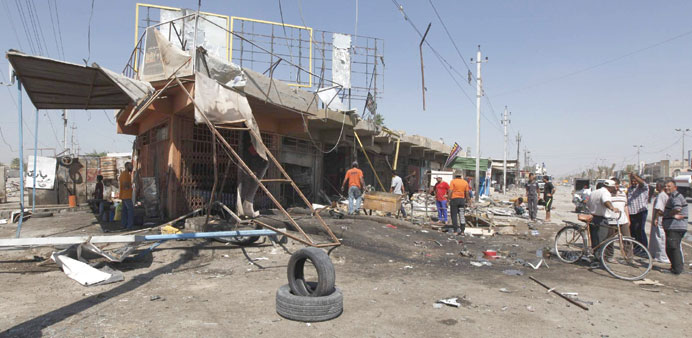People gather at the site of a car bomb attack in the Ur district of northeastern Baghdad yesterday.
AFP/Baghdad
Twelve car bombs, mainly targeting Shia-majority areas in and around Baghdad, killed at least 47 people yesterday, while at least three died in a blast against Sunni worshippers, officials said.
The bombings were the latest in a string of sectarian attacks in central Iraq that have raised the spectre of a return to the intense Sunni-Shia violence that peaked in 2006-2007 and killed tens of thousands of people.
The car bombs struck nine different areas, six of them Shia-majority, one confessionally mixed and two Sunni-majority, also wounding more than 140 people.
The deadliest attacks hit Kadhimiyah, a mainly Shia area of north Baghdad, where two car bombs killed at least nine people and wounded another 19.
In Baghdad Jadida, a bomb exploded in a car park, burning vehicles, destroying a fence and shattering the windows of nearby shops and a women’s clinic, an AFP journalist reported.
Security forces deployed to the area, closing off streets and using sniffer dogs to search for more bombs.
Later yesterday, a bomb exploded as worshippers left Al-Mustafa Mosque in the Dura area of south Baghdad, killing at least three people and wounding at least 12.
Central Iraq has seen a series of sectarian attacks on mosques and funerals in recent days.
On Sunday, a suicide bomber attacked mourners at a Shia mosque south of Baghdad, collapsing the roof and killing 47 people.
On Friday, bombs exploded near two Sunni mosques in Baghdad as worshippers left after prayers, killing six people.
Another bombing targeted Sunni mourners in Baghdad on September 23, killing 15 people, while an attack on a Sunni funeral killed 12 the day before.
Bombings targeting Shia mourners killed 73 people in Baghdad on September 21, and two blasts at a Sunni mosque north of the capital killed 18 a day before that.
The UN refugee agency has said it is “increasingly concerned about the situation in Iraq, where recent waves of sectarian violence threaten to spark new internal displacement of Iraqis fleeing bombings and other attacks”.
It said that about 5,000 Iraqis had already been displaced in 2013, joining more than 1.13mn who fled or were forced out of their homes in past years.
Attacks also hit Diyala and Nineveh provinces yesterday, killing two people and wounding one.
Yesterday’s violence came a day after a rare attack in Arbil—the usually quiet capital of Iraq’s autonomous Kurdish region—which killed seven security forces members and wounded more than 60 people.
The three-province northern region has largely been spared the attacks plaguing other areas of the country.
Violence in Iraq has reached a level not seen since 2008, when the country was just emerging from its brutal sectarian conflict.
Diplomats and analysts say the Shia-led government’s failure to address the grievances of the Sunni Arab minority—which complains of political exclusion and abuses by security forces—has driven the spike in violence.
Violence worsened sharply after security forces stormed a Sunni Arab anti-government protest camp in northern Iraq on April 23, sparking clashes in which dozens of people were killed.
The latest bloodshed brings the September death toll to more than 870, according to AFP figures based on security and medical sources. More than 4,700 people have been killed so far this year.

